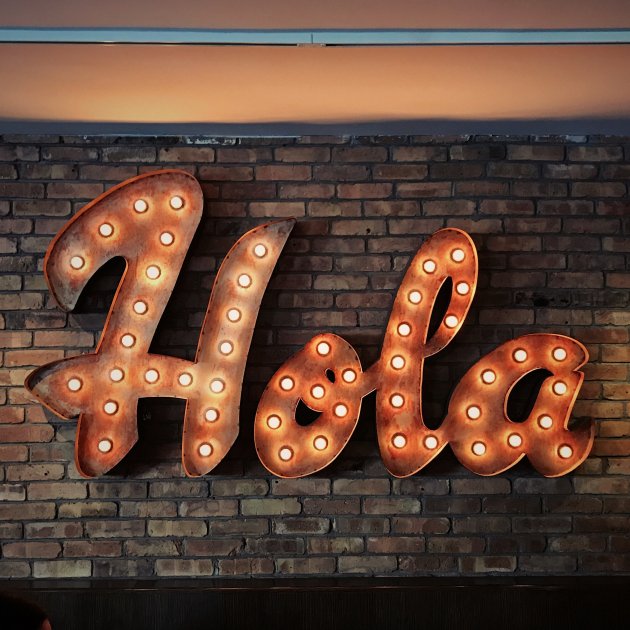Are you coming to Catalonia on holiday? Or maybe you've just moved to Barcelona? Whatever reason you're here for, learning a bit of the local language can really enhance your experience. Sure, you can use Spanish most everywhere (indeed, you can use English quite widely), but do you really want to? People can love it when you make even the slightest effort with Catalan. Those first attempts with the basics got me everything from free coffees to new friends. With that in mind, here's a selection of simple, super useful phrases you can keep up your sleeve, plus some notes to take it to the next level when you're ready:
Hola, bon dia! - Hello, good morning!
Yes, hola, like in Spanish, means “hello”. That's your basic, all-purpose greeting, but you can also get more specific if you want. Bon dia is used like “good morning”, although you may hear it a little later than you expect: from 12 it's migdia (literally “midday”), but you'll still say bon dia until the tarda “afternoon” starts properly about 3. After that, you'll hear bona tarda, “good afternoon”, and bon vespre, “good evening”. You can also say bona nit, “good night”, although, like in English, that's only for saying goodbye.
Photo: Steve Johnson / Unsplash
Adeu - Goodbye
Talking of saying goodbye, this is the most common way of doing that. It's so common, people even say it at the end of conversations that have otherwise been entirely in Spanish. And yes, just as it's adiós in Spanish and dios is “god”, and you can say adieu in French and dieu is “god”, deu is “god” in Catalan.
Com estàs? - How are you?
Com and estàs mean literally “how“ and “are you“. So that's easy. To answer, as in so many languages, you'll normally say (molt) bé “(very) good“, regardless of how you actually feel. Indeed, often people won't directly respond at all, just taking it as a friendly greeting.
Moltes gràcies – Thank you very much
If you're going to learn two words from this list, make it these two: moltes gràcies, “thank you”. So we could level up that reply to com estàs? and say (molt) bé, gràcies. To be even more polite, you can add i tu? (“and you?”) at the end. If you're wondering, well spotted, yes, molt and moltes are variation on a theme (molt, “very, a lot”).
Un cafè amb llet, sisplau – A latte, please
Sisplau is “please”, a shortened form of si us plau, literally “if it pleases you” (just like French s’il vous plaît). A cafè amb llet (literally “coffee with milk”) is essentially a latte, but with a little less milk than you might be used to – people in Catalonia want to taste that coffee! The other standard coffee drinks you can find in any restaurant or bar are the cafè sol, which is an espresso, and the tallat, which is an espresso with a splash of heated milk. Especially in summer, people like ordering these amb gel, “with ice”. You may also want sucre, “sugar”, or for the coffee to be descafeïnat, “decaffeinated”. Other drinks you could order are una birra, “a beer”, un te, “a tea” or una aigua, “a water”.
Photo: Şahin Yeşilyaprak / Unsplash
Ho sento - Sorry
This is your everyday, all-purpose apology – neither too off-hand nor too overwrought. I don't think I've anything else particular to add here, ho sento.
Parles anglès? - Do you speak English?
This is the normal way to say “do you speak English?”; if it's a markedly formal setting, it's better to go with parla (vostè) anglès? instead. If you speak Spanish, you could ask parles/parla castellà?, “do you speak Spanish?”. The word espanyol exists (Catalan ny is equivalent to Spanish ñ), but it's more common to hear the language called castellà. Both Catalan and Spanish are descendants of Latin that developed in the area that is now Spain; Catalan in Catalonia and surroundings (“the Catalan countries”) and “Spanish” in Castile, hence castellà, “Castilian”.
On és…? - Where is…?
Actually, here's the specific one you want: on és el lavabo?, “where is the toilet?”. But you could put anything in place of those three dots. Maybe on és la Sagrada Família? (in Eixample dreta, on the blue and purple metro lines, for what it's worth), or even on és Wally?, “where’s Wally/Waldo?”.
Photo: ACN
Sí/No - Yes/No
The word no means, well, “no”. So that's easy. And sí means “yes” (be careful with that accent when writing!). Got it? Sí? Great.
Tinc al·lèrgia… - I’m allergic to...
Assuming you're going to be trying the local food, one useful phrase might be tinc al·lèrgia…, “I’m allergic”, or more literally “I have an allergy to...”. Some common allergies are a la llet, to milk; als cacauets, to peanuts; al marisc, to seafood; al gluten, to gl… No, you're clever, you don't need me to tell you what that last one means.
Com es diu en català…? - How do you say … in Catalan?
Of course, a guide this short cannot be anything like exhaustive. Hopefully now, however, you've got the Catalan bug and want to learn more. This last one can help you with that.
Bona sort! (“Good luck!”)
